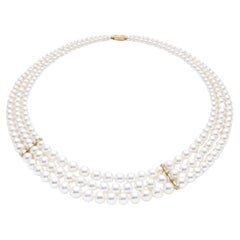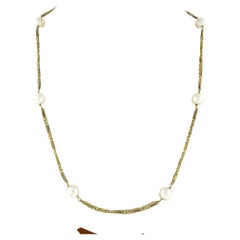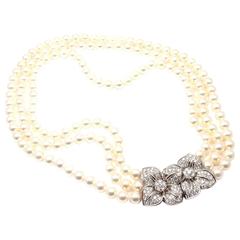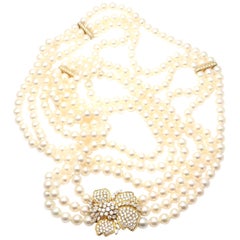Mikimoto Triple Strand
2010s Japanese Beaded Necklaces
Diamond, White Diamond, Pearl, 18k Gold, Yellow Gold
Vintage 1960s Beaded Necklaces
Pearl, 14k Gold
Recent Sales
20th Century Jewelry
Cultured Pearl, Diamond, Platinum
20th Century Japanese Multi-Strand Necklaces
Diamond, Pearl, 18k Gold, Yellow Gold
20th Century Japanese Multi-Strand Necklaces
Cultured Pearl, Diamond, 18k Gold
1990s Japanese Multi-Strand Necklaces
Pearl
2010s American Beaded Necklaces
Pearl, 18k Gold
2010s More Necklaces
People Also Browsed
1990s Japanese Beaded Necklaces
Pearl, Gold
Mid-20th Century Beaded Necklaces
Pearl, Sterling Silver
20th Century French Dome Rings
Pearl, Gold, 18k Gold, Yellow Gold
Vintage 1930s French Art Deco Pendant Necklaces
Pearl, Gold
Antique 19th Century Beaded Necklaces
Amber, 14k Gold, Gold
Mikimoto for sale on 1stDibs
Born to a noodle-shop owner, Japanese jeweler Kokichi Mikimoto (1858–1954) worked in the seafood business before shifting his focus to pearl cultivation. In 1893, he successfully developed the world’s first cultured pearls with a semispherical specimen. His further experimentation would include black and white South Sea pearls. This development gave Mikimoto a supply of what had once been a notoriously rare natural element and earned him the nickname “The Pearl King.” As he once said, “My dream is to adorn the necks of all women around the world with pearls.”
In 1899 in Tokyo’s Ginza district, Mikimoto opened his first, eponymous store in a white-stone building reminiscent of the color of pearls. He quickly earned a reputation for dazzling designs that blended Japanese craftsmanship and European influence. Mikimoto sent his jewelers to Europe to study the latest trends in jewelry and design; they brought back knowledge of Art Deco and Art Nouveau styles, which were incorporated into designs featuring Mikimoto’s pearls.
But Mikimoto’s creations were not met with enthusiasm by all. In 1921, a London newspaper called the designer’s jewelry “only imitations of real pearls” and claimed the company was “misleading” its customers. It developed into a lawsuit in the French courts, which ruled in Mikimoto’s favor, and raised the jeweler’s global profile.
He also brought his work international acclaim through exhibitions and world’s fairs, including the 1926 Sesquicentennial Exposition in Philadelphia where he unveiled a replica of the Liberty Bell covered with pearls. In 1927, Mikimoto met with Thomas Edison, who gave the jeweler’s invention probably its best compliment: “It is one of the wonders of the world that you were able to culture pearls. . . . This isn’t a cultured pearl, it’s a real pearl.”
Following World War II, Mikimoto opened stores around the world, with locations now in Paris, New York City, Los Angeles and Shanghai. Though its founder died in 1954, the Mikimoto company has continued to build on the legacy he established, producing collections of pearl necklaces and other pearl-centric jewelry that span a wide range of styles.
In 2017, the brand reopened its flagship Tokyo store, tapping architect Hiroshi Naito to design a new glittering facade whose 40,000 tiny glass plates are meant to evoke the movement of the ocean as they catch the light. The place where Mikimoto had his legendary success over a century ago is now known as Mikimoto Pearl Island and includes a museum on his life and pearls. A highlight is the “Boss’s Necklace,” which was the first made by Mikimoto and is the model for all the brand’s classic strands that have followed.
Find Mikimoto pendant necklaces, choker necklaces and a range of other jewelry on 1stDibs.
The Legacy of Pearl in Jewelry Design
The pearl has been synonymous with ladylike elegance since the Tudor period — learn what to look for when shopping for vintage and antique pearl jewelry as well as how to tell the origin of a pearl with our handy primer.
Every woman at some point in her life desires a simple strand of pearls. They are elegant, timeless, versatile — just ask Coco Chanel or Jacqueline Kennedy — and valuable. In 1917, Pierre Cartier famously traded a double-strand of natural pearls for a Fifth Avenue mansion, the Cartier brand’s flagship store ever since. And if you were born in the beginning of summer, pearl is the June birthstone.
It is possible to tell where a pearl originated from its appearance. Akoyas are usually round and white — the classic pearl, if you will. South Sea pearls are normally larger and vary in color; orangey yellow ones are not uncommon. Tahitian pearls are mostly black but can also be gray or brown, and between the Akoya and the South Sea varieties in size. Freshwater pearls, or Orientals, run the gamut in terms of color and size, but in shape, they tend to resemble Rice Krispies. Another important distinction is a round pearl versus a baroque pearl. A round pearl is self-explanatory, but there are two types of baroque pearls: symmetrical and asymmetrical. In general, the symmetrical variation commands a higher valuation. Within a strand of pearls, uniformity is prized — the more the individual pearls resemble one another, the more valuable the strand.
According to the Gemological Institute of America (GIA), the earliest recorded mention of a pearl was in 2206 BC by a Chinese historian. Centuries later, Christopher Columbus made it a point to visit pearl fisheries during his 15th-century exploration of the Caribbean. Since the late-19th century, the Japanese have been at the forefront of cultivating pearls, when jeweler Kokichi Mikimoto successfully cultured the world’s first pearl in 1893.
On 1stDibs, find vintage and antique pearl necklaces, pearl earrings and other accessories.
Finding the Right Necklaces for You
We are fortunate to know much of the world’s long and dazzling history of necklaces, as this type of jewelry was so treasured that it was frequently buried with its owners. Today, Van Cleef necklaces, Tiffany necklaces and Cartier necklaces are some of the most popularly searched designer necklaces on 1stDibs.
Lapis lazuli beads adorned necklaces unearthed from the royal graves at the ancient Iraqi civilization of Sumer, while the excavation of King Tut’s burial chamber revealed a sense of style that led to a frenzy of Art Deco designs, with artisans of the 1920s seeking to emulate the elegant work crafted by Ancient Egypt’s goldsmiths and jewelry makers.
In ancient times, pendant necklaces worn by royalty and nobles conferred wealth and prestige. Today, wearing jewelry is about personal expression: Luxury diamond necklaces exude confidence and can symbolize the celebratory nature of a deep romantic relationship, while paper-clip chain-link necklaces designed by the likes of goldsmith Faye Kim are firmly planted in the past as well as the present. Kim works exclusively with eco-friendly gold, and these fashionable, fun accessories owe to the design of 19th-century watch fobs.
For some, necklaces are thought of as being a solely feminine piece, but this widely loved accessory has been gender-neutral for eons. In fact, just as women rarely took to wearing a single necklace during the Renaissance, men of the era layered chains and valuable pendants atop their bejeweled clothing. In modern times, the free-spirited hippie and counterculture movements of the 1960s saw costume-jewelry designers celebrating self-expression through colorful multistrand necklaces and no shortage of beads, which were worn by anyone and everyone.
Even after all of these years, the necklace remains an irrefutable staple of any complete outfit. Although new trends in jewelry are constantly emerging, the glamour and beauty of the past continue to inform modern styles and designs. In a way, the cyclical history of the necklace differs little from its familiar looped form: The celebrated French jewelry house Van Cleef & Arpels found much inspiration in King Tut, and, now, their Alhambra collection is a go-to for modern royals. Vintage David Webb necklaces — whose work landed him on the cover of Vogue in 1950, two years after opening his Manhattan shop — were likely inspired by the ornamental styles of ancient Greece, Mesopotamia and Egypt.
On 1stDibs, browse top designers like Dior, Chanel and Bulgari, or shop by your favorite style, from eye-catching choker necklaces to understated links to pearl necklaces and more.
- 1stDibs ExpertMarch 22, 2022Yes, Mikimoto pearls tend to at least hold their value over time. In some cases, the value of the brand's pearl jewelry increases over time due to demand and the effects of inflation. Keep in mind that the value of any piece of jewelry depends on its condition. Properly storing and caring for your pieces can help to ensure that they retain their value for years to come. On 1stDibs, shop a selection of Mikimoto pearl jewelry.
- Are Mikimoto pearls Akoya?2 Answers1stDibs ExpertAugust 17, 2021No, not all Mikimoto pearls are Akoya. Mikimoto also uses Black South Sea cultured pearls, White South Sea cultured pearls, Golden South Sea cultured pearls, and Conch pearls to create their jewelry. Shop Mikimoto Akoya pearl jewelry on 1stDibs.1stDibs ExpertMarch 22, 2022Yes, Mikimoto pearls are Akoya, meaning they come from Akoya oysters. The brand largely pioneered the production of cultured pearls, which are genuine pearls developed with human assistance. Mikimoto creates Akoya pearl necklaces, pendants, earrings, bracelets, rings and brooches. On 1stDibs, shop a variety of Mikimoto pearl jewelry.
- 1stDibs ExpertOctober 12, 2021How much a Mikimoto pearl necklace is worth will depend on the size of the strand, the number of pearls used and the design. It could range from $920 to $21,000, with a wide variety of price points in between. From pendant and choker to multi-strand and rope versions, find Mikimoto pearl necklaces on 1stDibs.



